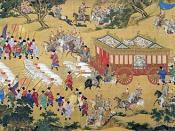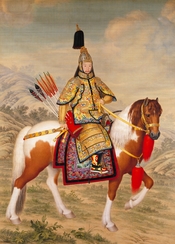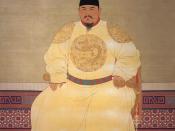Ancient China's civilization began approximately 8,000 years ago on the banks of three great rivers. These were the Yellow in the north, the Wei in the northwest and the Yanzi in the south. For centuries, the Ancient Chinese (having been enclosed by mountains, deserts and seas and having little contact with the outside world) developed their own way of life and called their country the Middle Kingdom, as they believed it to be the centre of the universe.
China had been subjected to incessant warfare over the centuries and yearned for peace, thus the Emperor came into being about 1800 BC. He brought the many smaller states together. The idea of having an emperor originated from their idea of God having a son to send down to earth and keep the world in order. The emperor also possessed a 'gift' known as the 'mandate of heaven'. This was the belief that the emperor was given heavenly permission to rule.
The mandate meant that the leader was the son of heaven. An emperor's subjects expected him to be wise, hardworking, unselfish, good, and a brilliant military leader. People rebelled against a leader who didn't care for their wellbeing, and believed the heavenly spirits showed their displeasure with him through natural disasters, like an earthquake, drought, flood or famine. The mandate was then taken away and given to someone else, or others could fight for the right. The winner therefore achieved the mandate.
The Emperor ensured the people were brought together into one social structure where everyone knew their place. The aristocracy were eventually abloished and territories divided. Previously, there had been a multitude of scattered villages, with little or no structure within them. A social system emanating from the emperor down came into being. This was very beneficial to the Chinese...



Very good
this essay is very well explained. clear and stright forward, nice job
4 out of 4 people found this comment useful.